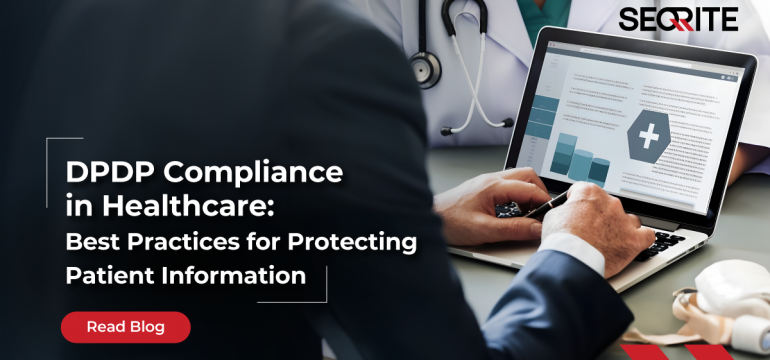The modern-day healthcare industry faces unique cybersecurity challenges. On the one hand, cutting-edge technologies and increasing digitization have helped elevate healthcare quality, yet they have also threatened the privacy and security of patient data. According to The HIPPA Journal’s Healthcare Data Breach Statistics, there has been an upward trend in incidents and severity globally over the past 14 years, soaring to new heights in 2023, with 133 million records exposed, stolen, or otherwise impermissibly disclosed.
Back home, the Indian healthcare industry is staring at a fresh hurdle — the new Digital Personal Data Protection (DPDP) Act, which strictly governs how businesses collect, process, store, and share their patients’/customers’ personal information. Noncompliance with the DPDP Act may result in legal repercussions and heavy penalties of up to INR 250 crores. Hence, safeguarding sensitive data has become even more critical for healthcare providers as it may fetch significant financial and reputational damages.
This blog explores the best practices for protecting patient information in healthcare, focusing on Seqrite’s DPDP compliance solutions.
Challenges faced by Healthcare in Patient Data Protection
- Complex Data Handling: Various professionals, from doctors to lab technicians, handle patient information, each requiring different access levels. This multi-level access increases the risk of unauthorized data exposure.
- Diverse Data Types: Healthcare data includes everything from personal identifiers to detailed medical histories, all of which must be protected under stringent regulations.
- Extended Threat Perimeter: The use of mobile devices, cloud storage, and digital health apps has expanded the attack surface, making healthcare data more vulnerable to cyberattacks.
Best Practices for Protecting Patient Information
To address these challenges, healthcare organizations must implement robust data protection strategies. Here are some best practices that can help safeguard patient data:
- Implement a Security Management System: A comprehensive security management system is crucial. This involves creating policies, procedures, and guidelines for data protection coupled with regular staff training. The system should comply with the DPDP Act’s legal and regulatory requirements to maintain patient data’s confidentiality, integrity, and availability.
- Encrypt Sensitive Data: Encryption is a fundamental security measure that converts data into a code, readable only by authorized individuals. Healthcare providers should identify and encrypt personal health information (PHI) and personal identifying information (PII) using appropriate methods. Encryption should be part of a broader security strategy that includes firewalls, intrusion detection systems, and access controls.
- Regular Data Backups: Regular backups are essential to prevent data loss in case of breaches, system failures, or disasters. Healthcare organizations should implement a backup schedule tailored to their specific needs, ensuring that critical data is always secure and recoverable.
- Monitor and Log Data Access: Monitoring and logging access to patient data can help detect and respond to unauthorized access or suspicious activity. Implementing technical controls like intrusion detection systems and regular vulnerability assessments are vital to maintaining data security.
- Implement Access Controls: Access to patient data should be limited to authorized personnel only. Authentication methods, such as user IDs, passwords, smart cards, or biometrics, should be enforced to ensure secure access. Additionally, physical security measures, like controlled access to sensitive areas, can further protect patient information.
- Conduct Regular Risk Assessments: Regular risk assessments help identify potential vulnerabilities and threats to patient data. By proactively addressing these risks, healthcare organizations can strengthen their security posture and protect sensitive information.
- Develop an Incident Response Plan: An effective incident response plan is essential for managing data breaches, system failures, or other security incidents. This plan should include a designated response team, regular incident response exercises, and clear communication channels to ensure a swift and coordinated response to any security incident.
- Ensure Legal and Regulatory Compliance: Compliance with data protection laws and regulations, such as the DPDP Act and HIPAA, is non-negotiable. Healthcare providers must stay updated on the latest legal requirements and ensure their data protection measures are fully compliant.
Leveraging Seqrite’s DPDP Compliance Solution
Seqrite offers comprehensive data privacy management solutions to help healthcare organizations comply with the DPDP Act and other global data privacy regulations. Our key offerings include:
- Seqrite Data Privacy: This powerful system helps organizations discover, categorize, and manage sensitive information across their resources. It also simplifies subject rights request management, ensuring compliance with data privacy laws.
- Seqrite Endpoint Protection: Our award-winning Endpoint Protection provides 360-degree data protection, with advanced features like Data Loss Prevention and integration with the Seqrite Cloud Sandbox for real-time threat detection and analysis.
- Seqrite XDR: This extended detection and response tool fortifies data privacy capabilities by responding spontaneously to critical stealthy incidents like Zero Days and Advanced Persistent Threats, thus preventing further attacks.
- Seqrite MDR: Our Cybersecurity as a Service offering integrates advanced machine intelligence and human proficiency to detect and respond to potential data breaches, ensuring total security of corporate resources.
- Seqrite ZTNA: This platform enforces a zero-trust access paradigm, ensuring only verified users can access sensitive data.
Conclusion
The importance of data privacy in the healthcare industry is undisputed. By implementing the best practices outlined above and leveraging Seqrite’s DPDP compliance solutions, healthcare organizations can protect patient information, comply with legal requirements, and maintain their patients’ trust.
For more information on how Seqrite can help you achieve comprehensive data privacy management, contact us today or visit our website.




